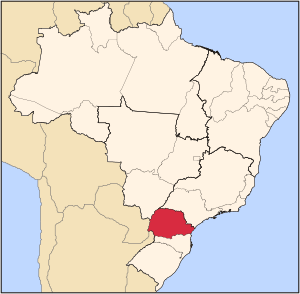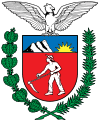Paraná (state) facts for kids
Quick facts for kids
State of Paraná
|
|||
|---|---|---|---|
|
|||

Location of State of Paraná in Brazil
|
|||
| Country | |||
| Capital and Largest City | Curitiba | ||
| Area | |||
| • Total | 199,314.9 km2 (76,955.9 sq mi) | ||
| Area rank | 9th | ||
| Population
(2012)
|
|||
| • Total | 10,577,755 | ||
| • Rank | 6th | ||
| • Density | 53.070568/km2 (137.45214/sq mi) | ||
| • Density rank | 12th | ||
| Demonym(s) | Paranaense | ||
| GDP | |||
| • Year | 2006 estimate | ||
| • Total | R$ 136,681,000,000 (5th) | ||
| • Per capita | R$ 13,158 (7th) | ||
| HDI | |||
| • Year | 2011 | ||
| • Category | 0.823 – high (7th) | ||
| Time zone | UTC-3 (BRT) | ||
| • Summer (DST) | UTC-2 (BRST) | ||
| Postal Code |
80000-000 to 86990-000
|
||
| ISO 3166 code | BR-PR | ||
| Website | pr.gov.br | ||
Paraná is a state in Southern Brazil. It is next to Paraguay and Argentina. Its capital is Curitiba. Paraná is a famous state because of the Itaipu Dam and the amazing Iguaçu Falls.
Contents
Geography of Paraná
Paraná is bordered by the state of São Paulo to the north. To the east, it meets the Atlantic Ocean. In the south, it shares borders with Santa Catarina and the Misiones Province of Argentina. To the west, it is next to Mato Grosso do Sul and the country of Paraguay. The Paraná River forms its western boundary line.
People and Culture
Paraná is one of the Brazilian states that shows many signs of recent European colonization. Most of the population are descendants of European settlers. This makes it one of the most ethnically diverse states in Brazil.
Waves of European immigrants started arriving after 1850. These groups mainly included Germans, Italians, Poles, and Ukrainians. The growth of the state is closely connected to the arrival of these immigrants. Today, people from other Brazilian states also come to Paraná. They often come from São Paulo, Santa Catarina, Rio Grande do Sul, and the Northeast Region. They move to Paraná looking for a better life.
Diverse Ancestries
People of Polish descent are mostly found in the central and southern parts of the state. Many live around Curitiba. Italians are mostly found in the capital city, Curitiba, and along the coast. People of Ukrainian descent are common in some cities, like Prudentópolis. Many Ukrainians live throughout the state. Germans are mostly found in a few cities, such as Rolândia. Almost all towns have many Portuguese people and their descendants.
People of mixed-race ancestry are mostly found in some towns in the north. There is also an important Muslim community. These are mainly Lebanese and Syrian people around Foz do Iguaçu. In the north, there are many people of Japanese descent.
Major Cities
The main cities of Paraná are:
- Curitiba: This is the capital and largest city, located in the east.
- Londrina: The second largest city, found in the north.
- Maringá: The third largest city, also in the north.
- Foz do Iguaçu: The fourth largest city, located in the west.
- Ponta Grossa: The fifth largest city, in the center-east.
- Cascavel: The sixth largest city, in the center-west.
- São José dos Pinhais: The seventh largest city, part of Greater Curitiba.
- Colombo: The eighth largest city, also part of Greater Curitiba.
- Guarapuava: The ninth largest city, in the center.
- Paranaguá: The tenth largest city, on the east coast.
Economy and Development
Paraná is an important state for Brazil's economy. Its economy includes farming, industry, and services. The state's total economic output, called GDP, was R$ 136.681 billion in 2006. This made it the 5th largest economy among Brazilian states. The average income per person was R$ 13,158, ranking 7th.
The state also has a high HDI. In 2011, its HDI was 0.823, which is considered high. This ranked Paraná as the 7th state in Brazil for human development. This index measures things like life expectancy, education, and income.
Images for kids
-
Araucaria is a symbol of Paraná
-
Downtown Curitiba.
-
Itaipu Dam in Foz do Iguaçú.
See also
 In Spanish: Estado de Paraná para niños
In Spanish: Estado de Paraná para niños
 | Leon Lynch |
 | Milton P. Webster |
 | Ferdinand Smith |





















